HND Unit 32: International Conference on Sustainable Tourism Report
VerifiedAdded on 2023/01/12
|9
|2118
|37
Report
AI Summary
This report provides a detailed analysis of sustainable and responsible tourism management, focusing on the evolution of the concept and its key features. It examines the roles and missions of leading global organizations involved in promoting sustainable practices, such as The Center for Responsible Travel, highlighting their functions in fostering economic growth and environmental stewardship. The report further explores the purpose and principles of tourism development and planning, emphasizing the minimization of adverse effects on the economy, environment, society, and culture. It evaluates the process of tourism development, including market trend analysis, objective setting, strategy implementation, and promotional adjustments, alongside the challenges and problems associated with it. The report concludes by emphasizing the importance of adhering to sustainability principles within the tourism sector to ensure long-term benefits and effective operations.
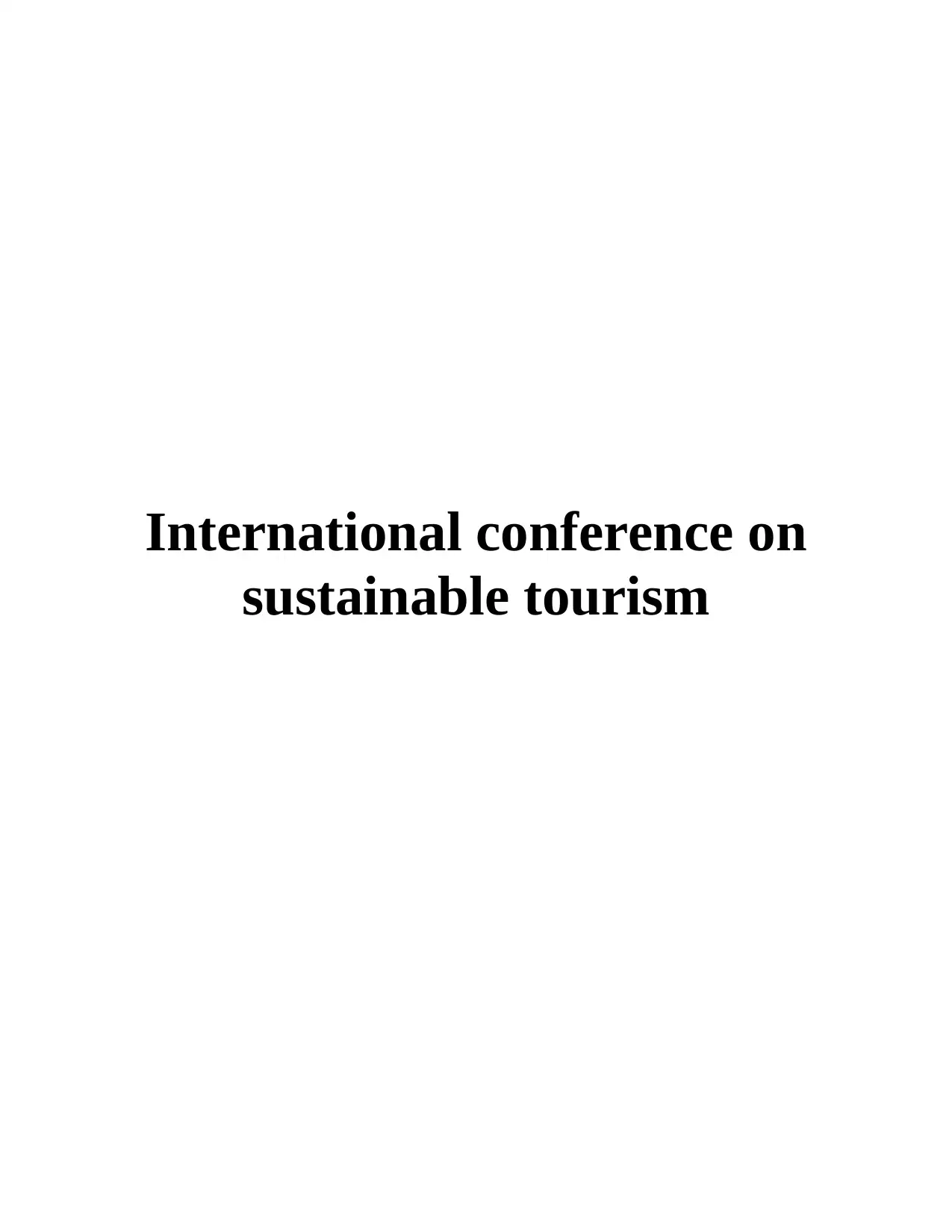
International conference on
sustainable tourism
sustainable tourism
Paraphrase This Document
Need a fresh take? Get an instant paraphrase of this document with our AI Paraphraser
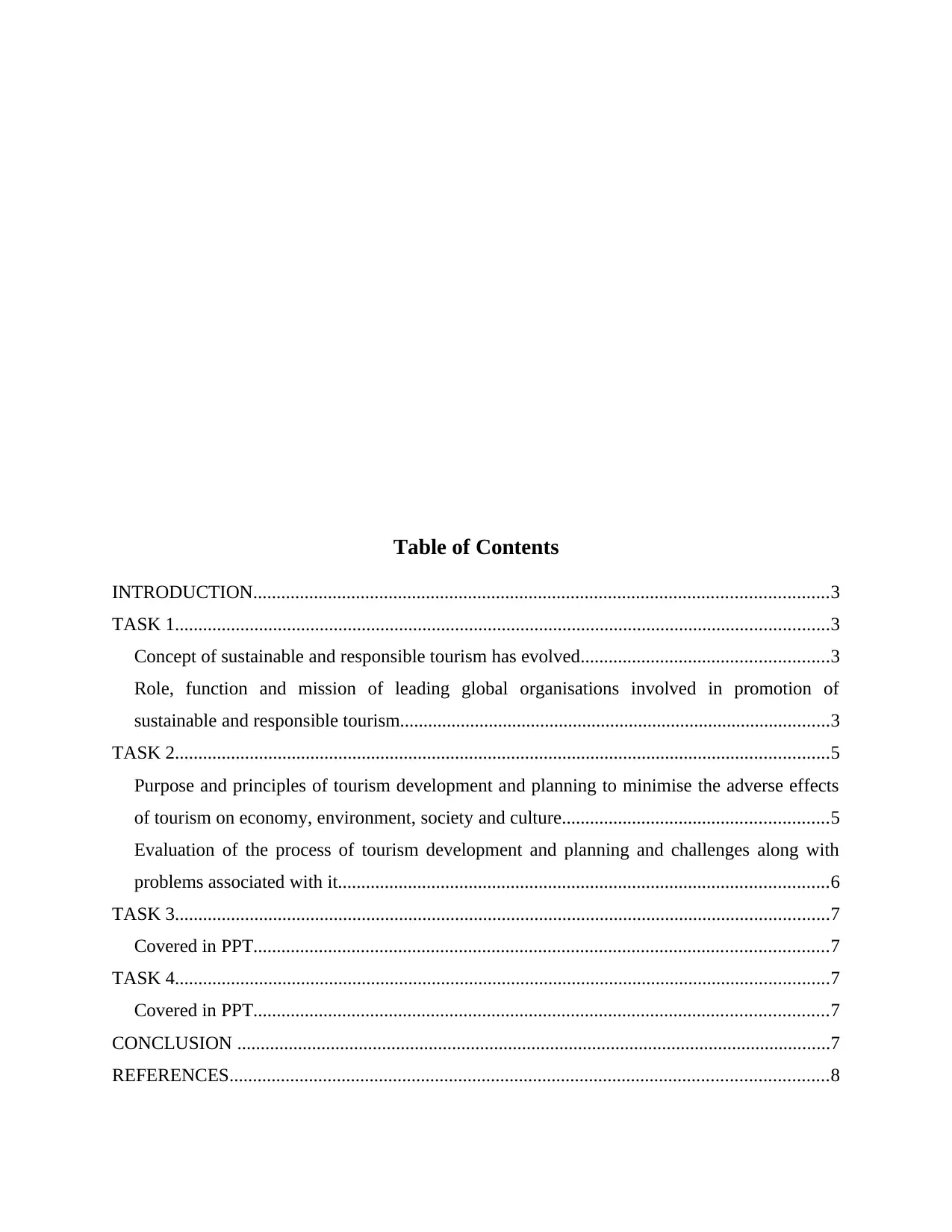
Table of Contents
INTRODUCTION...........................................................................................................................3
TASK 1............................................................................................................................................3
Concept of sustainable and responsible tourism has evolved.....................................................3
Role, function and mission of leading global organisations involved in promotion of
sustainable and responsible tourism............................................................................................3
TASK 2............................................................................................................................................5
Purpose and principles of tourism development and planning to minimise the adverse effects
of tourism on economy, environment, society and culture.........................................................5
Evaluation of the process of tourism development and planning and challenges along with
problems associated with it.........................................................................................................6
TASK 3............................................................................................................................................7
Covered in PPT...........................................................................................................................7
TASK 4............................................................................................................................................7
Covered in PPT...........................................................................................................................7
CONCLUSION ...............................................................................................................................7
REFERENCES................................................................................................................................8
INTRODUCTION...........................................................................................................................3
TASK 1............................................................................................................................................3
Concept of sustainable and responsible tourism has evolved.....................................................3
Role, function and mission of leading global organisations involved in promotion of
sustainable and responsible tourism............................................................................................3
TASK 2............................................................................................................................................5
Purpose and principles of tourism development and planning to minimise the adverse effects
of tourism on economy, environment, society and culture.........................................................5
Evaluation of the process of tourism development and planning and challenges along with
problems associated with it.........................................................................................................6
TASK 3............................................................................................................................................7
Covered in PPT...........................................................................................................................7
TASK 4............................................................................................................................................7
Covered in PPT...........................................................................................................................7
CONCLUSION ...............................................................................................................................7
REFERENCES................................................................................................................................8

⊘ This is a preview!⊘
Do you want full access?
Subscribe today to unlock all pages.

Trusted by 1+ million students worldwide
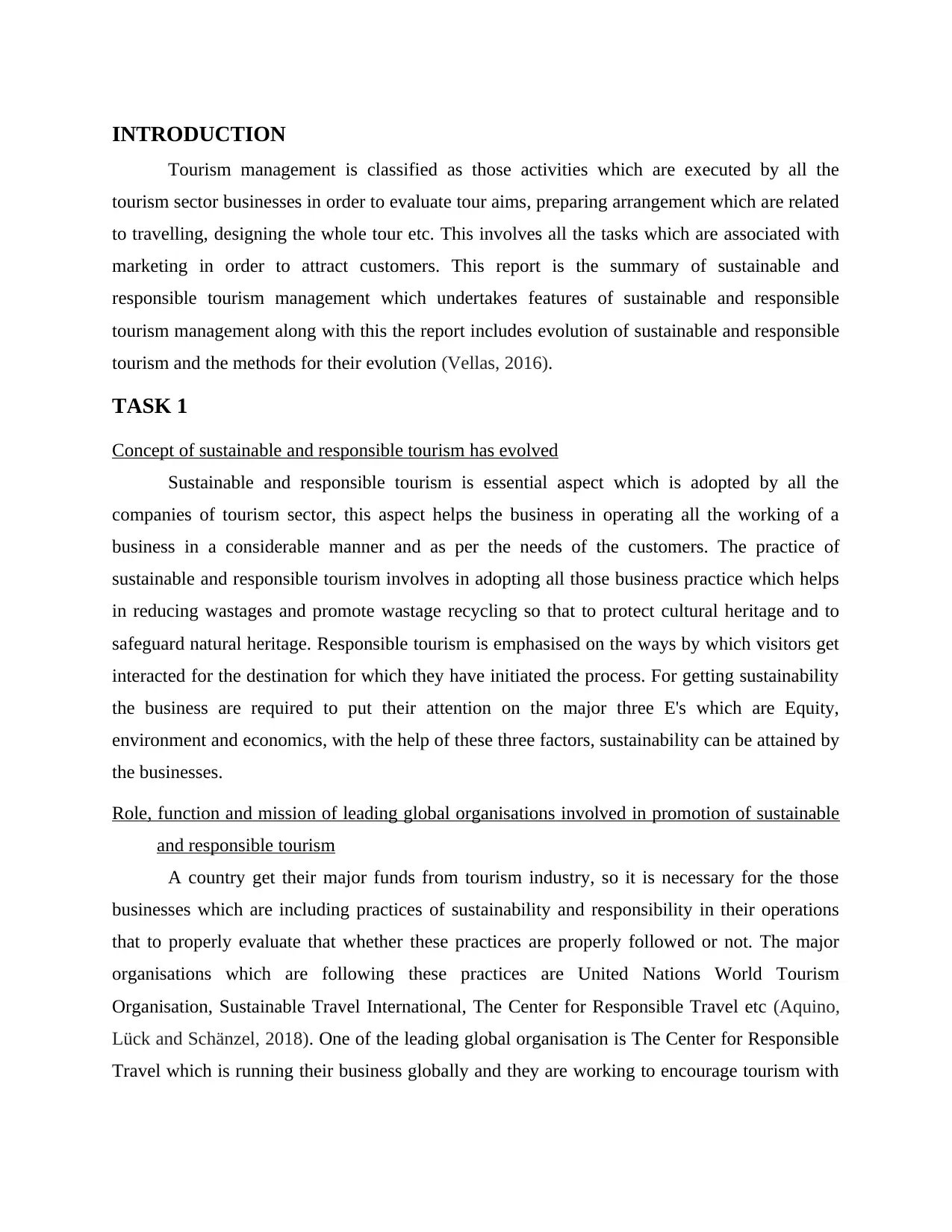
INTRODUCTION
Tourism management is classified as those activities which are executed by all the
tourism sector businesses in order to evaluate tour aims, preparing arrangement which are related
to travelling, designing the whole tour etc. This involves all the tasks which are associated with
marketing in order to attract customers. This report is the summary of sustainable and
responsible tourism management which undertakes features of sustainable and responsible
tourism management along with this the report includes evolution of sustainable and responsible
tourism and the methods for their evolution (Vellas, 2016).
TASK 1
Concept of sustainable and responsible tourism has evolved
Sustainable and responsible tourism is essential aspect which is adopted by all the
companies of tourism sector, this aspect helps the business in operating all the working of a
business in a considerable manner and as per the needs of the customers. The practice of
sustainable and responsible tourism involves in adopting all those business practice which helps
in reducing wastages and promote wastage recycling so that to protect cultural heritage and to
safeguard natural heritage. Responsible tourism is emphasised on the ways by which visitors get
interacted for the destination for which they have initiated the process. For getting sustainability
the business are required to put their attention on the major three E's which are Equity,
environment and economics, with the help of these three factors, sustainability can be attained by
the businesses.
Role, function and mission of leading global organisations involved in promotion of sustainable
and responsible tourism
A country get their major funds from tourism industry, so it is necessary for the those
businesses which are including practices of sustainability and responsibility in their operations
that to properly evaluate that whether these practices are properly followed or not. The major
organisations which are following these practices are United Nations World Tourism
Organisation, Sustainable Travel International, The Center for Responsible Travel etc (Aquino,
Lück and Schänzel, 2018). One of the leading global organisation is The Center for Responsible
Travel which is running their business globally and they are working to encourage tourism with
Tourism management is classified as those activities which are executed by all the
tourism sector businesses in order to evaluate tour aims, preparing arrangement which are related
to travelling, designing the whole tour etc. This involves all the tasks which are associated with
marketing in order to attract customers. This report is the summary of sustainable and
responsible tourism management which undertakes features of sustainable and responsible
tourism management along with this the report includes evolution of sustainable and responsible
tourism and the methods for their evolution (Vellas, 2016).
TASK 1
Concept of sustainable and responsible tourism has evolved
Sustainable and responsible tourism is essential aspect which is adopted by all the
companies of tourism sector, this aspect helps the business in operating all the working of a
business in a considerable manner and as per the needs of the customers. The practice of
sustainable and responsible tourism involves in adopting all those business practice which helps
in reducing wastages and promote wastage recycling so that to protect cultural heritage and to
safeguard natural heritage. Responsible tourism is emphasised on the ways by which visitors get
interacted for the destination for which they have initiated the process. For getting sustainability
the business are required to put their attention on the major three E's which are Equity,
environment and economics, with the help of these three factors, sustainability can be attained by
the businesses.
Role, function and mission of leading global organisations involved in promotion of sustainable
and responsible tourism
A country get their major funds from tourism industry, so it is necessary for the those
businesses which are including practices of sustainability and responsibility in their operations
that to properly evaluate that whether these practices are properly followed or not. The major
organisations which are following these practices are United Nations World Tourism
Organisation, Sustainable Travel International, The Center for Responsible Travel etc (Aquino,
Lück and Schänzel, 2018). One of the leading global organisation is The Center for Responsible
Travel which is running their business globally and they are working to encourage tourism with
Paraphrase This Document
Need a fresh take? Get an instant paraphrase of this document with our AI Paraphraser
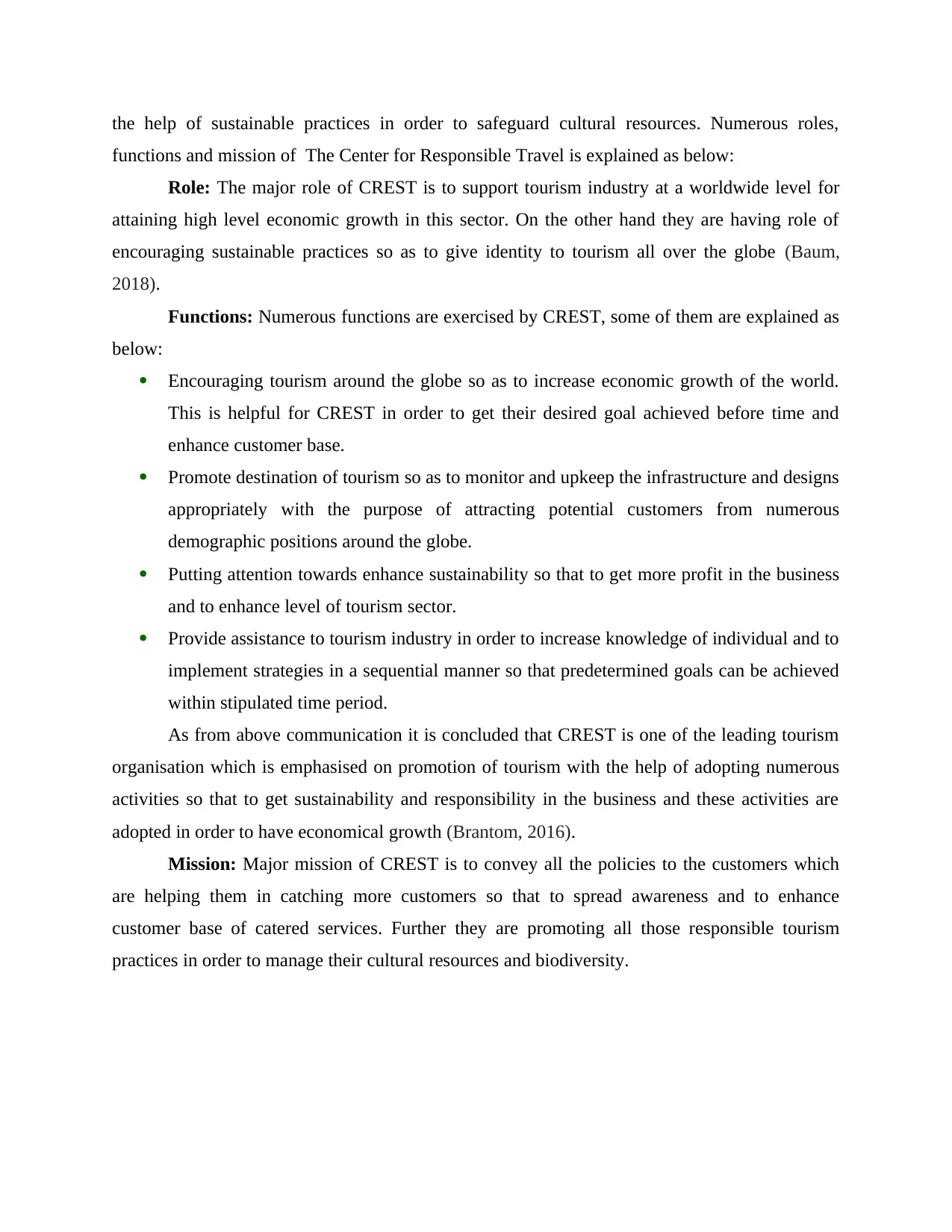
the help of sustainable practices in order to safeguard cultural resources. Numerous roles,
functions and mission of The Center for Responsible Travel is explained as below:
Role: The major role of CREST is to support tourism industry at a worldwide level for
attaining high level economic growth in this sector. On the other hand they are having role of
encouraging sustainable practices so as to give identity to tourism all over the globe (Baum,
2018).
Functions: Numerous functions are exercised by CREST, some of them are explained as
below:
Encouraging tourism around the globe so as to increase economic growth of the world.
This is helpful for CREST in order to get their desired goal achieved before time and
enhance customer base.
Promote destination of tourism so as to monitor and upkeep the infrastructure and designs
appropriately with the purpose of attracting potential customers from numerous
demographic positions around the globe.
Putting attention towards enhance sustainability so that to get more profit in the business
and to enhance level of tourism sector.
Provide assistance to tourism industry in order to increase knowledge of individual and to
implement strategies in a sequential manner so that predetermined goals can be achieved
within stipulated time period.
As from above communication it is concluded that CREST is one of the leading tourism
organisation which is emphasised on promotion of tourism with the help of adopting numerous
activities so that to get sustainability and responsibility in the business and these activities are
adopted in order to have economical growth (Brantom, 2016).
Mission: Major mission of CREST is to convey all the policies to the customers which
are helping them in catching more customers so that to spread awareness and to enhance
customer base of catered services. Further they are promoting all those responsible tourism
practices in order to manage their cultural resources and biodiversity.
functions and mission of The Center for Responsible Travel is explained as below:
Role: The major role of CREST is to support tourism industry at a worldwide level for
attaining high level economic growth in this sector. On the other hand they are having role of
encouraging sustainable practices so as to give identity to tourism all over the globe (Baum,
2018).
Functions: Numerous functions are exercised by CREST, some of them are explained as
below:
Encouraging tourism around the globe so as to increase economic growth of the world.
This is helpful for CREST in order to get their desired goal achieved before time and
enhance customer base.
Promote destination of tourism so as to monitor and upkeep the infrastructure and designs
appropriately with the purpose of attracting potential customers from numerous
demographic positions around the globe.
Putting attention towards enhance sustainability so that to get more profit in the business
and to enhance level of tourism sector.
Provide assistance to tourism industry in order to increase knowledge of individual and to
implement strategies in a sequential manner so that predetermined goals can be achieved
within stipulated time period.
As from above communication it is concluded that CREST is one of the leading tourism
organisation which is emphasised on promotion of tourism with the help of adopting numerous
activities so that to get sustainability and responsibility in the business and these activities are
adopted in order to have economical growth (Brantom, 2016).
Mission: Major mission of CREST is to convey all the policies to the customers which
are helping them in catching more customers so that to spread awareness and to enhance
customer base of catered services. Further they are promoting all those responsible tourism
practices in order to manage their cultural resources and biodiversity.
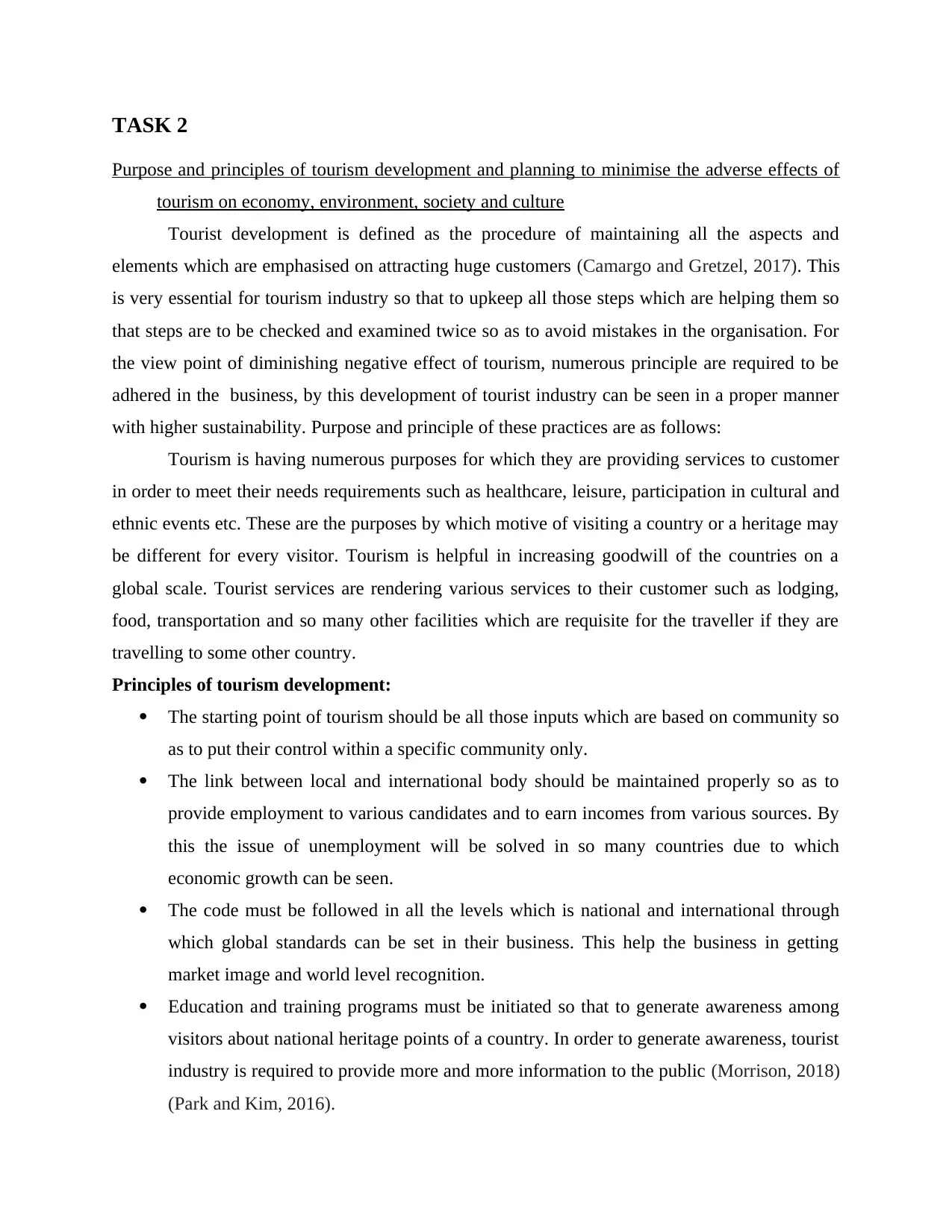
TASK 2
Purpose and principles of tourism development and planning to minimise the adverse effects of
tourism on economy, environment, society and culture
Tourist development is defined as the procedure of maintaining all the aspects and
elements which are emphasised on attracting huge customers (Camargo and Gretzel, 2017). This
is very essential for tourism industry so that to upkeep all those steps which are helping them so
that steps are to be checked and examined twice so as to avoid mistakes in the organisation. For
the view point of diminishing negative effect of tourism, numerous principle are required to be
adhered in the business, by this development of tourist industry can be seen in a proper manner
with higher sustainability. Purpose and principle of these practices are as follows:
Tourism is having numerous purposes for which they are providing services to customer
in order to meet their needs requirements such as healthcare, leisure, participation in cultural and
ethnic events etc. These are the purposes by which motive of visiting a country or a heritage may
be different for every visitor. Tourism is helpful in increasing goodwill of the countries on a
global scale. Tourist services are rendering various services to their customer such as lodging,
food, transportation and so many other facilities which are requisite for the traveller if they are
travelling to some other country.
Principles of tourism development:
The starting point of tourism should be all those inputs which are based on community so
as to put their control within a specific community only.
The link between local and international body should be maintained properly so as to
provide employment to various candidates and to earn incomes from various sources. By
this the issue of unemployment will be solved in so many countries due to which
economic growth can be seen.
The code must be followed in all the levels which is national and international through
which global standards can be set in their business. This help the business in getting
market image and world level recognition.
Education and training programs must be initiated so that to generate awareness among
visitors about national heritage points of a country. In order to generate awareness, tourist
industry is required to provide more and more information to the public (Morrison, 2018)
(Park and Kim, 2016).
Purpose and principles of tourism development and planning to minimise the adverse effects of
tourism on economy, environment, society and culture
Tourist development is defined as the procedure of maintaining all the aspects and
elements which are emphasised on attracting huge customers (Camargo and Gretzel, 2017). This
is very essential for tourism industry so that to upkeep all those steps which are helping them so
that steps are to be checked and examined twice so as to avoid mistakes in the organisation. For
the view point of diminishing negative effect of tourism, numerous principle are required to be
adhered in the business, by this development of tourist industry can be seen in a proper manner
with higher sustainability. Purpose and principle of these practices are as follows:
Tourism is having numerous purposes for which they are providing services to customer
in order to meet their needs requirements such as healthcare, leisure, participation in cultural and
ethnic events etc. These are the purposes by which motive of visiting a country or a heritage may
be different for every visitor. Tourism is helpful in increasing goodwill of the countries on a
global scale. Tourist services are rendering various services to their customer such as lodging,
food, transportation and so many other facilities which are requisite for the traveller if they are
travelling to some other country.
Principles of tourism development:
The starting point of tourism should be all those inputs which are based on community so
as to put their control within a specific community only.
The link between local and international body should be maintained properly so as to
provide employment to various candidates and to earn incomes from various sources. By
this the issue of unemployment will be solved in so many countries due to which
economic growth can be seen.
The code must be followed in all the levels which is national and international through
which global standards can be set in their business. This help the business in getting
market image and world level recognition.
Education and training programs must be initiated so that to generate awareness among
visitors about national heritage points of a country. In order to generate awareness, tourist
industry is required to provide more and more information to the public (Morrison, 2018)
(Park and Kim, 2016).
⊘ This is a preview!⊘
Do you want full access?
Subscribe today to unlock all pages.

Trusted by 1+ million students worldwide
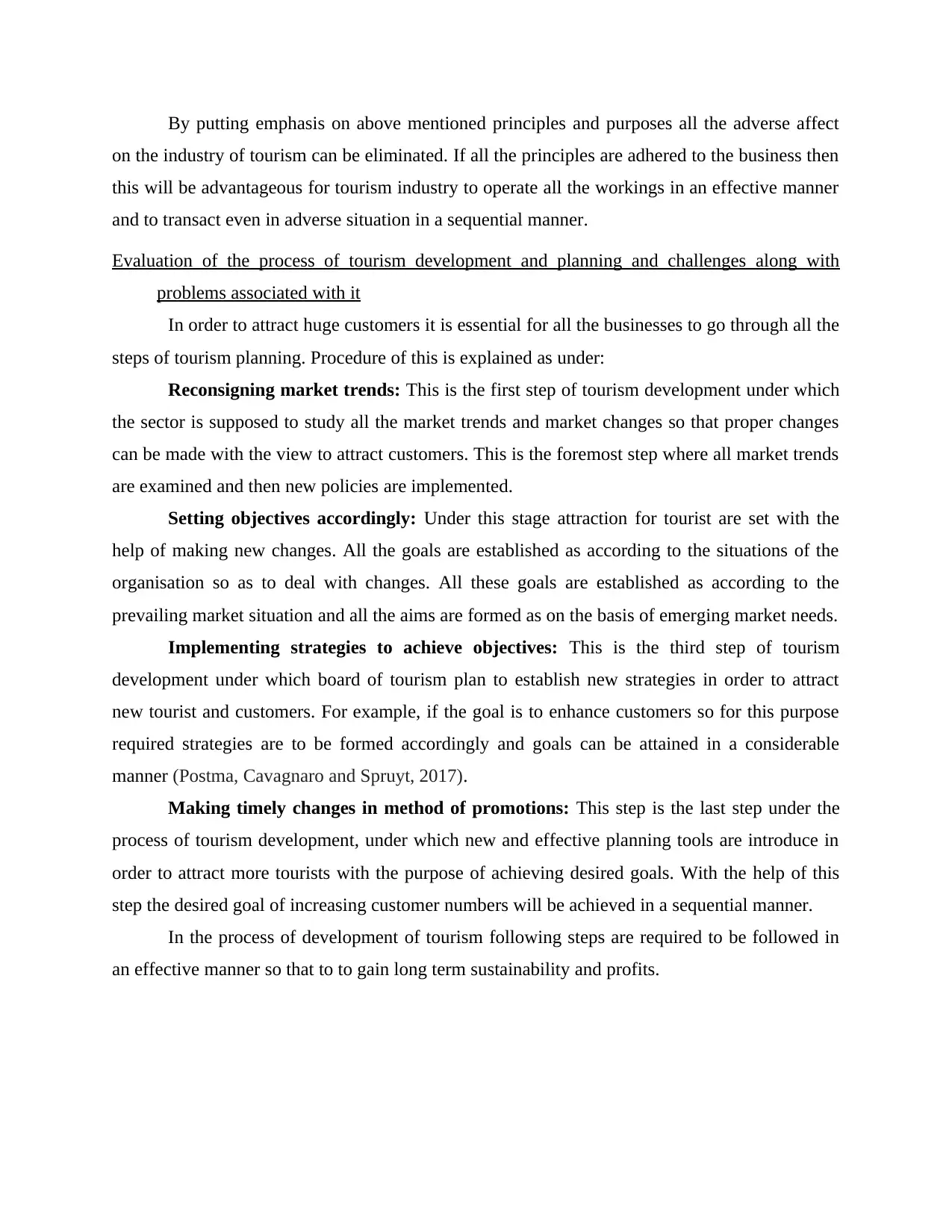
By putting emphasis on above mentioned principles and purposes all the adverse affect
on the industry of tourism can be eliminated. If all the principles are adhered to the business then
this will be advantageous for tourism industry to operate all the workings in an effective manner
and to transact even in adverse situation in a sequential manner.
Evaluation of the process of tourism development and planning and challenges along with
problems associated with it
In order to attract huge customers it is essential for all the businesses to go through all the
steps of tourism planning. Procedure of this is explained as under:
Reconsigning market trends: This is the first step of tourism development under which
the sector is supposed to study all the market trends and market changes so that proper changes
can be made with the view to attract customers. This is the foremost step where all market trends
are examined and then new policies are implemented.
Setting objectives accordingly: Under this stage attraction for tourist are set with the
help of making new changes. All the goals are established as according to the situations of the
organisation so as to deal with changes. All these goals are established as according to the
prevailing market situation and all the aims are formed as on the basis of emerging market needs.
Implementing strategies to achieve objectives: This is the third step of tourism
development under which board of tourism plan to establish new strategies in order to attract
new tourist and customers. For example, if the goal is to enhance customers so for this purpose
required strategies are to be formed accordingly and goals can be attained in a considerable
manner (Postma, Cavagnaro and Spruyt, 2017).
Making timely changes in method of promotions: This step is the last step under the
process of tourism development, under which new and effective planning tools are introduce in
order to attract more tourists with the purpose of achieving desired goals. With the help of this
step the desired goal of increasing customer numbers will be achieved in a sequential manner.
In the process of development of tourism following steps are required to be followed in
an effective manner so that to to gain long term sustainability and profits.
on the industry of tourism can be eliminated. If all the principles are adhered to the business then
this will be advantageous for tourism industry to operate all the workings in an effective manner
and to transact even in adverse situation in a sequential manner.
Evaluation of the process of tourism development and planning and challenges along with
problems associated with it
In order to attract huge customers it is essential for all the businesses to go through all the
steps of tourism planning. Procedure of this is explained as under:
Reconsigning market trends: This is the first step of tourism development under which
the sector is supposed to study all the market trends and market changes so that proper changes
can be made with the view to attract customers. This is the foremost step where all market trends
are examined and then new policies are implemented.
Setting objectives accordingly: Under this stage attraction for tourist are set with the
help of making new changes. All the goals are established as according to the situations of the
organisation so as to deal with changes. All these goals are established as according to the
prevailing market situation and all the aims are formed as on the basis of emerging market needs.
Implementing strategies to achieve objectives: This is the third step of tourism
development under which board of tourism plan to establish new strategies in order to attract
new tourist and customers. For example, if the goal is to enhance customers so for this purpose
required strategies are to be formed accordingly and goals can be attained in a considerable
manner (Postma, Cavagnaro and Spruyt, 2017).
Making timely changes in method of promotions: This step is the last step under the
process of tourism development, under which new and effective planning tools are introduce in
order to attract more tourists with the purpose of achieving desired goals. With the help of this
step the desired goal of increasing customer numbers will be achieved in a sequential manner.
In the process of development of tourism following steps are required to be followed in
an effective manner so that to to gain long term sustainability and profits.
Paraphrase This Document
Need a fresh take? Get an instant paraphrase of this document with our AI Paraphraser
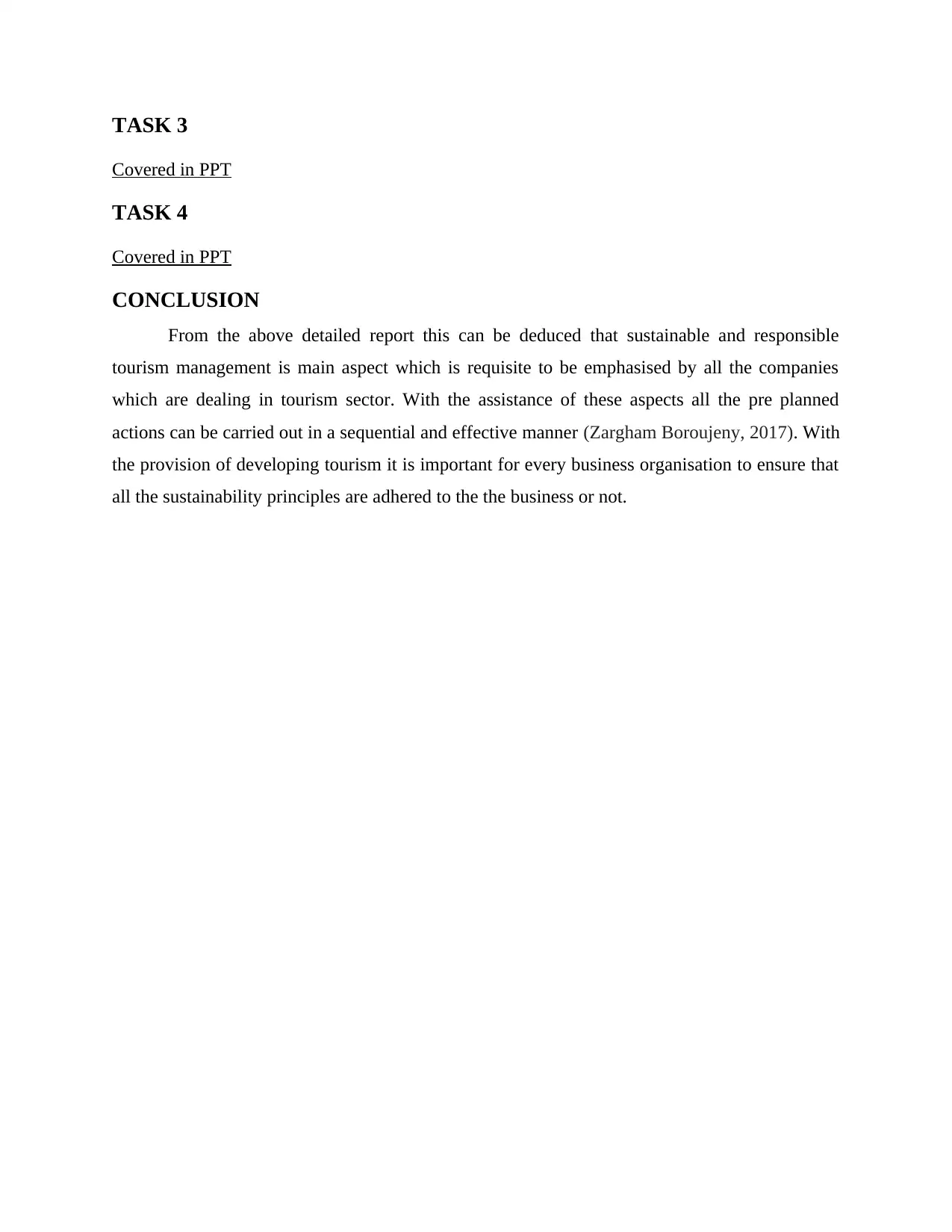
TASK 3
Covered in PPT
TASK 4
Covered in PPT
CONCLUSION
From the above detailed report this can be deduced that sustainable and responsible
tourism management is main aspect which is requisite to be emphasised by all the companies
which are dealing in tourism sector. With the assistance of these aspects all the pre planned
actions can be carried out in a sequential and effective manner (Zargham Boroujeny, 2017). With
the provision of developing tourism it is important for every business organisation to ensure that
all the sustainability principles are adhered to the the business or not.
Covered in PPT
TASK 4
Covered in PPT
CONCLUSION
From the above detailed report this can be deduced that sustainable and responsible
tourism management is main aspect which is requisite to be emphasised by all the companies
which are dealing in tourism sector. With the assistance of these aspects all the pre planned
actions can be carried out in a sequential and effective manner (Zargham Boroujeny, 2017). With
the provision of developing tourism it is important for every business organisation to ensure that
all the sustainability principles are adhered to the the business or not.
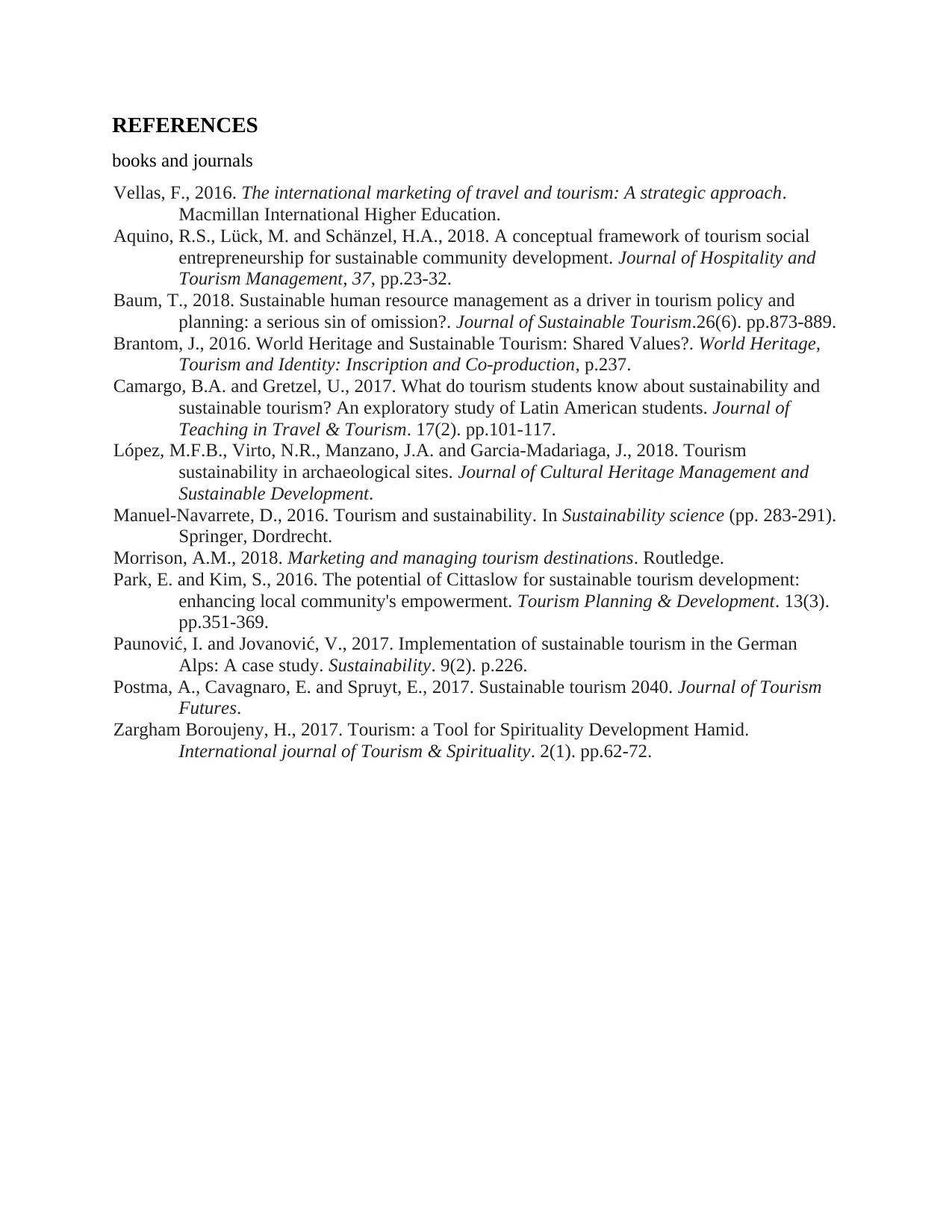
REFERENCES
books and journals
Vellas, F., 2016. The international marketing of travel and tourism: A strategic approach.
Macmillan International Higher Education.
Aquino, R.S., Lück, M. and Schänzel, H.A., 2018. A conceptual framework of tourism social
entrepreneurship for sustainable community development. Journal of Hospitality and
Tourism Management, 37, pp.23-32.
Baum, T., 2018. Sustainable human resource management as a driver in tourism policy and
planning: a serious sin of omission?. Journal of Sustainable Tourism.26(6). pp.873-889.
Brantom, J., 2016. World Heritage and Sustainable Tourism: Shared Values?. World Heritage,
Tourism and Identity: Inscription and Co-production, p.237.
Camargo, B.A. and Gretzel, U., 2017. What do tourism students know about sustainability and
sustainable tourism? An exploratory study of Latin American students. Journal of
Teaching in Travel & Tourism. 17(2). pp.101-117.
López, M.F.B., Virto, N.R., Manzano, J.A. and Garcia-Madariaga, J., 2018. Tourism
sustainability in archaeological sites. Journal of Cultural Heritage Management and
Sustainable Development.
Manuel-Navarrete, D., 2016. Tourism and sustainability. In Sustainability science (pp. 283-291).
Springer, Dordrecht.
Morrison, A.M., 2018. Marketing and managing tourism destinations. Routledge.
Park, E. and Kim, S., 2016. The potential of Cittaslow for sustainable tourism development:
enhancing local community's empowerment. Tourism Planning & Development. 13(3).
pp.351-369.
Paunović, I. and Jovanović, V., 2017. Implementation of sustainable tourism in the German
Alps: A case study. Sustainability. 9(2). p.226.
Postma, A., Cavagnaro, E. and Spruyt, E., 2017. Sustainable tourism 2040. Journal of Tourism
Futures.
Zargham Boroujeny, H., 2017. Tourism: a Tool for Spirituality Development Hamid.
International journal of Tourism & Spirituality. 2(1). pp.62-72.
books and journals
Vellas, F., 2016. The international marketing of travel and tourism: A strategic approach.
Macmillan International Higher Education.
Aquino, R.S., Lück, M. and Schänzel, H.A., 2018. A conceptual framework of tourism social
entrepreneurship for sustainable community development. Journal of Hospitality and
Tourism Management, 37, pp.23-32.
Baum, T., 2018. Sustainable human resource management as a driver in tourism policy and
planning: a serious sin of omission?. Journal of Sustainable Tourism.26(6). pp.873-889.
Brantom, J., 2016. World Heritage and Sustainable Tourism: Shared Values?. World Heritage,
Tourism and Identity: Inscription and Co-production, p.237.
Camargo, B.A. and Gretzel, U., 2017. What do tourism students know about sustainability and
sustainable tourism? An exploratory study of Latin American students. Journal of
Teaching in Travel & Tourism. 17(2). pp.101-117.
López, M.F.B., Virto, N.R., Manzano, J.A. and Garcia-Madariaga, J., 2018. Tourism
sustainability in archaeological sites. Journal of Cultural Heritage Management and
Sustainable Development.
Manuel-Navarrete, D., 2016. Tourism and sustainability. In Sustainability science (pp. 283-291).
Springer, Dordrecht.
Morrison, A.M., 2018. Marketing and managing tourism destinations. Routledge.
Park, E. and Kim, S., 2016. The potential of Cittaslow for sustainable tourism development:
enhancing local community's empowerment. Tourism Planning & Development. 13(3).
pp.351-369.
Paunović, I. and Jovanović, V., 2017. Implementation of sustainable tourism in the German
Alps: A case study. Sustainability. 9(2). p.226.
Postma, A., Cavagnaro, E. and Spruyt, E., 2017. Sustainable tourism 2040. Journal of Tourism
Futures.
Zargham Boroujeny, H., 2017. Tourism: a Tool for Spirituality Development Hamid.
International journal of Tourism & Spirituality. 2(1). pp.62-72.
⊘ This is a preview!⊘
Do you want full access?
Subscribe today to unlock all pages.

Trusted by 1+ million students worldwide
1 out of 9
Related Documents
Your All-in-One AI-Powered Toolkit for Academic Success.
+13062052269
info@desklib.com
Available 24*7 on WhatsApp / Email
![[object Object]](/_next/static/media/star-bottom.7253800d.svg)
Unlock your academic potential
Copyright © 2020–2025 A2Z Services. All Rights Reserved. Developed and managed by ZUCOL.





